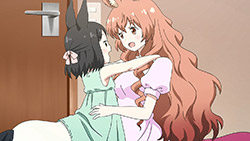 |
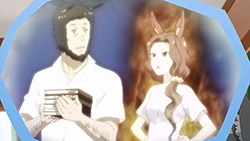 |
 |
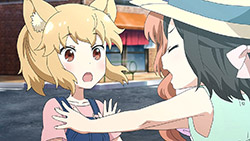 |
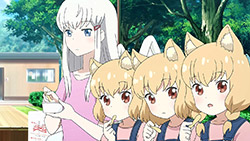 |
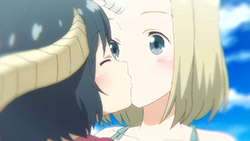 |
 |
 |
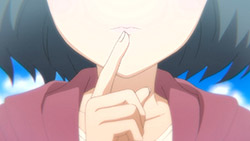 |
 |
 |
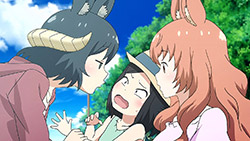 |
 |
 |
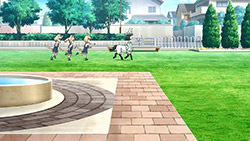 |
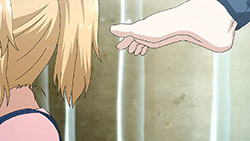 |
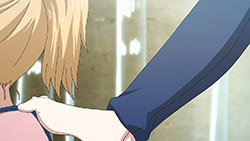 |
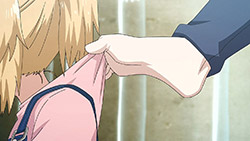 |
 |
 |
 |
 |
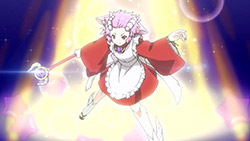 |
 |
 |
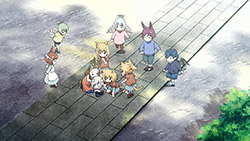 |
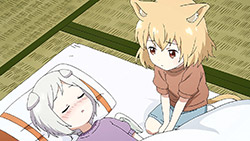 |
 |
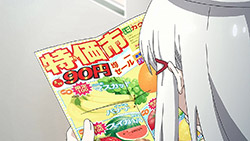 |
 |
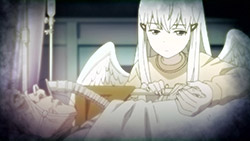 |
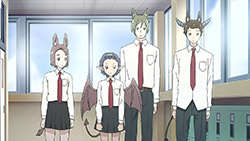 |
 |
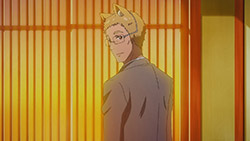 |
 |
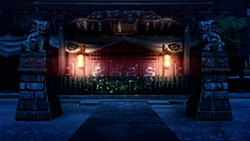 |
「小さい子のあのバイタリティは何処からくるの? 時代や年代を問わず、魔法少女って人気あるよね。」 (Chiisana Ko no Ano Baitariti wa Dokokara Kuru no? Jidai ya Nendai o Towazu, Mahou Shoujo tte Ninki Aru yo ne.)
“Where Do the Little Ones Get So Much Vitality? Regardless of the Generation, Magical Girls Are Popular, Huh?”
If you’re a fan of Manami, this is the episode for you. We see the multiple facets of her daily life as she balances her leadership position in the student council and giving her little sisters enough affection while her dad is out. I appreciate how much attention they are giving towards Manami’s motivations as we see what her daily life with her sisters is like, and we understand why Manami tries to do everything in her power to see them more. Her resistance against some of the overbearing members of the student council gave us better insight on how her grandfather’s passing molded how she wanted to dedicate as much time as she can to her family.
At the same time, there is also a heavy contrast in Manami’s definition of affection, and how Himeno and Mitsuyo express their feelings towards those around them. The first section gives us insight on Himeno’s bond with her little cousin Shino, and the defensiveness Shino has over her big cousin as far as who can kiss her. As the day passes, Himeno is able to realize how important it is for her to care for Shino, and live up to the image Shino has of her as a loving cousin who gives her TLC. Manami, however, is somewhat troubled by how her sisters are very direct about how they want to show their love with kisses.
In the process, we see that Manami went to the Hitomi Shizuki Academy of Romance, and tries to tell her sisters that girls can’t kiss girls. Enter Mitsuyo Akechi, who brought her girlfriend to scoff at the notion. As comical as Mitsuyo is, she’s actually provides the sisters with a mature explanation of the differences between kissing someone you like and kissing someone you love deeply, and why the latter should only be saved for that special someone in the future.
Although a bulk of the episode is on the meaning of familial love, it also gives us some background on what beliefs and media the public lives on. The scene above shows that oddly enough, such a society that aggressively pushes for racial tolerance can still look at same-sex affection with guarded concern. Whereas Mitsuyo and Inukai haven’t been seen receiving any hatred just yet for their lesbian relationship, Manami can openly consider Mitsuyo to be perverse for showing her little sisters that girls can kiss other girls.
Additionally, so much of the media consumed in the universe has a strange emphasis on democracy. Himeno tells Shino a story early on about how the world’s shift to democracy joined the story’s characters together. The first scene of the second half also has Manami’s sisters watching a sentai show that espouses the noble power that democracy can have against the monster-of-the-week. The omnipresence of government influence on what the general populace consumes is taken to it’s highest extreme, especially given that the government of this universe operates under the idea that they’re always checking up on whether you’re truly on your best behavior. It shows that even when there are absolutely no secret agents or heavily armed security officers, Centaur no Nayami can still make the characters feel like they are under the thumb of the rhetoric that allows the state to consider their oppressive rule as part of a public-sanctioned democracy.

This show really has a fetish or kissing, doesn’t it?? The uber-adorable triplets are very bright for kindergarteners and are learning how different people treat affection. The somehow-even-MORE-adorable littlest daughter was a welcome focus of the second half too.
I didn’t expect that the show would have as much kissing as it did, but it is a good way of keeping the mood light. The cat sisters were very adorable though as was the angel girl that the zashiki-warashi was looking over.
“Girls don’t kiss once they grow up”. Cue the resident lesbian couple to make fun of it. That was gold.
I must thank the reviews you write here to make me try this series. I had seen the manga once, bit it wasn’t my cup of tea. I think it found a more appealing look and pace in the anime adaptation. At first I thought it would be just a generic slice of life anime with moe, this time with mosnter girls, but now I see it’s full of social commentary and worldbuilding. I didn’t expect that.
I actually think that it has more to do with how kissing and other gestures of affection in public are a more serious thing in Japan. Children can enjoy more leeway because they are kids, but once they grow up it’s not socially acceptable. However, class rep managed to word it in a way that made her look like a heteronormative crusader. Which would be strange, given that she didn’t seem to have a problem with their relationship in previous episodes and even called them “girlfriends” in public. But doing “lewd” things in front of kids? That’s a no-no.
It sounds like a moe-dystopian scenario XD What I, for one, see it’s an obsession with politically correct media and anti-discrimination policies, themes that are indeed more typical of democracies nowadays than authoritarian regimes. The author seems to be playing it up to eleven to create a fascinating scenario.
Manami hasn’t been shown to have an issue with Mitsuyo kissing Inukai or any other same-sex kissing she’s encountered since the 1st episode until it’s around her little sisters. I guess it would just be because her sisters would be too young to explain the complexities of love. Not sure if it’s just the awkward nature of subtitles making Manami look like she’s policing heteronormativity or if that’s how the manga went, but it could just reflect on the rigidity of showing displays of affection in Japan.
My takeaway from the show so far is that the personal needs of different races are abandoned because acknowledging the schisms or the long-lasting effects of conflict would conflict with a push to make everybody the same. I could be wrong, and the series might just have a further slant against real life anti-discrimination methods, but so far the show does introduce a new way of looking at what would happen if equality was pushed towards its most logical extreme in a heavily diverse society.
I do feel that the show might hit a slippery slope if the idea it’s going with is that anti-discrimination policies will lead to an authoritarian Big Brother society like what’s in the show. It probably seems like the manga would hit a moral grey area in the States because we are very diverse and have many vulnerable races who are prone to being preyed upon without anti-discrimination policies. In a Japanese context, it wouldn’t be too surprising if it reflected on the anxiety about the rising number of the non-Japanese population in the eyes of the older generations. If the takeaway would be “immigrants should never assimilate because treating them like us will lead to political correctness gone mad”, then that’d be messed up. But I have faith in the show to present the world from a relatively neutral standpoint.
Why do you consider this show’s society an “authoritarian Big Brother”? Beyond the enforcement of political correctness in school and children’s media (which happens in real life democracies very often), and Kyouko’s worries about being caught performing a perceived discriminatory act towards Himeno (which is not unlike how Nozomi was worried sick about Himeno’s modelling in episode 2, and that didn’t make the school a dictatorship), nothing implies the government isn’t just a democratic state obsessed with ensuring equality for all the races.
However, I know next to nothing about the original source material, so perhaps later developments will prove me wrong.
I’d say the society’s government comes off as authoritarian by the methods they use to enact and reinforce the laws of the land that place obedience to the law over personal freedom.
There isn’t a cult of personality or dictator figure as of yet, so it would make sense if it were a democratic government gone awry due to a mutual agreement between politicians to enact said laws.
There’s just a sense of eeriness that comes off like the characters don’t have as much agency because oppressive laws dictate how they behave, and can only overlook what they don’t see.
Where it might not be authoritarian in the sense of having one centralized dictator, but would be in the sense that the standards and procedures of law enforcement steer towards giving the government the strongest power and influence over what ideas are disseminated to the public and how the public should behave.
Mm, I don’t know. Perhaps it’s because I live in Europe and I’m more used to the government having a tighter grip on rules and regulations for every area of society, but I don’t see the authoritarianism in the methods either, just a very strong state (which may be anathema for some, but not so much for others) and a society that tries to embrace political correctness as the solution to racial tensions. I think that independent moral guardians and corporate self-censorship could also play a role. Add a certain Japanese fondness for social conformity and law enforcement, and it all starts looking like the things seen in the show.
I believe you are misunderstanding this. This wasn’t anti-lesbian propoganda. It was “why are you doing lewd things in front of children?!” A girl and a boy kissing in that fashion would have gotten the same reaction. Or a boy and a boy, for that matter. It’s just that the context of how Tama-chan had tried to simplify her explanation of why she didn’t kiss Hime down to a level where kindergarteners could understand it ended up making two girls the most amusing choice, so the author brought in the yuri couple.
I don’t think that what the show was aiming for was anti-lesbian propaganda, but the subtitles, or at least the context of where the conversation was going, made it seem like instead of saying that she has no interest in kissing Himeko, she was saying that older girls don’t kiss each other.
What I was getting at with the quote was that with the government policing how people treat race, I was surprised that sexuality never got the same strict treatment. Where if it’s already a death sentence to openly discriminate against a race or get charged with a hate crime for riding a centaur, it seems odd that they haven’t policed sexuality enough that Manami wouldn’t have to worry about getting charged for saying girls don’t kiss when they’re older.
I agree that it’s likely to be because she didn’t want to explain why older people don’t kiss each other as casually compared to familial cheek kissing. It would make sense that she said what she did so she wouldn’t have to explain why people kiss each other when they’re older, and Mitsuyo displaying contradictory information sped up having to give that info much sooner than she would’ve hoped.
I think Wanderer has hit the “nail that stands up” on the head here. To (some) Western eyes, this episode comes over as distinctly anti-LGBTQ, but really it’s much more against inappropriate public displays of affection.
I guess it’s a case of values disonance. In other countries, parents may not bat an eyelid if a couple kisses in front of some kids. If someone takes issue, it can be interpreted as them being against the couple, not against the act of kissing in public.
Is it just me, or did little Shino’s voice sound a bit off? Like it was forced or something. Chi-chans and Sue seemed fine.
Also I’m a bit sad they cut some funny details like Chi-chan complaining that using feet is rude, and that the mahou shoujo sequence was cut short.
really I’m just sad anything with Chi-chan triplets gets cut because I love those kidsTo not be all negative nancy because honestly the episode was my favorite this far, here’s a shout-out to facts I really liked: the glasses and hats for folks with animal ears were really nice touch. (special mention to the fact that earholes don’t protect from sunburns!)
The plight of a mother…
https://randomc.net/image/Centaur%20no%20Nayami/Centaur%20no%20Nayami%20-%2003%20-%20Large%2019.jpg
“You just want to go home!”
“And?”
So much win. XD
https://randomc.net/image/Centaur%20no%20Nayami/Centaur%20no%20Nayami%20-%2003%20-%20Large%2023.jpg
The whole magical girl anime blatantly looks like something a state-sponsored media outlet would come up with… (As a rule, state-sponsored media outlets are something I’d rather avoid like the plague…or at least read/watch with a grain of salt. Including those from my own.)
With the way it bludgeons into viewers’ heads the value of an ideology (democracy in this case, but every government is guilty of doing something like that to their people at one point or another no matter their political spectrum) it’s definitely less subtle than Space Battleship Yamato, GATE, or even the “Holy Military Moe Trinity” of Strike Witches, Girls und Panzer (plus Upotte!!) and Kantai Collection (plus Arpeggio and Hai-Furi). Those shows–at various points in time–are known to have been accused by critics of glorifying WWII-era Japan. That said, those same shows had at least some subtlety/discreetness in dealing with that touchy subject and were good at diverting attention away from that in order to focus on their own story.
@Ep 04:
Okay, okay. I admit defeat, you won me over. I do not care anymore about the Military role and the other Secret Services. I just enjoy the “Lucky Star” and Slice of Life.. even if its mostly based on Girly stuff 🙂
Please continue, i got hooked